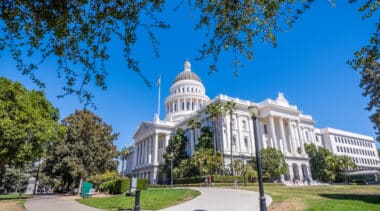Geoffrey Lawrence is research director at Reason Foundation.
Lawrence has been a financial executive in both the public and private sectors and has served as chief financial officer of publicly traded, growth stage, and startup manufacturing and distribution companies. He was CFO of Players Network, the first fully reporting, publicly traded marijuana licensee to be listed on a U.S. exchange, CFO of C Quadrant, a startup manufacturer and distributor that was subsequently sold to Lowell Farms (LOWL), CFO of Apex Extractions, a manufacturer and distributor based in Oakland that he helped take public, and, most recently, CFO of Claybourne Co., a top-3 flower brand in California by market share. Through these roles, Lawrence raised capital, planned capital expenditure, prepared financial forecasts, implemented systems for accounting and inventory control, designed internal control processes, managed monthly and quarterly closings and reporting, managed compliance with state and local regulations, negotiated contracts, and prepared filings with the U.S. Securities and Exchange Commission.
Lawrence also served as a senior appointee to the Nevada Controller’s Office, where he oversaw the state’s external financial reporting. Prior to joining Reason Foundation in 2018, Lawrence had also spent a decade as a policy analyst on labor, fiscal, and energy issues between North Carolina’s John Locke Foundation and the Nevada Policy Research Institute.
Lawrence is additionally the founder and president of an accounting and advisory firm with particular expertise in the licensed cannabis industry and public markets.
Lawrence holds an M.S. and B.S. in accounting from Western Governors University, an M.A. in international economics from American University, and a B.A. in international relations from the University of North Carolina at Pembroke. He lives in Las Vegas with his wife and two children and enjoys baseball and mixed martial arts.
-
Nevada Question 7 would require voter identification
As a proposed constitutional amendment, it would need to be approved by a majority of voters in successive elections.
-
South Dakota Measure 29 would legalize the recreational use of marijuana
Measure 29 protects the rights of individuals to deliver, transfer, or sell marijuana to each other.
-
Florida Amendment 3 would legalize recreational marijuana
Florida Amendment 3 proposes a constitutional amendment that would protect the right of adults to possess up to three ounces of marijuana without penalty.
-
A framework for federal and state hemp-derived cannabinoid regulation
The growing popularity of hemp-derived products has stimulated significant legislative attention in recent years, with over 90 regulatory proposals introduced in state legislatures in 2024 alone.
-
Colorado should rethink proposed psychedelic application fees
There are several areas where the draft permanent rules on fees for psychedelic applications proposed by the Colorado Department of Revenue could be enhanced.
-
Colorado could improve regulatory rules regarding psychedelic use
As Colorado establishes an operating regulatory framework for The Natural Medicine Health Act, there is room for improvement in rulemaking.
-
How the FDA can safely approve a promising but controversial mental health drug
The FDA’s existing processes may be able to address the advisory committee’s worries about the previous tests.
-
A Schedule III designation is still overly restrictive for marijuana
A Schedule III designation fails to fully align federal and state law in the states that authorize some form of commercial market in marijuana.
-
New Jersey Senate Bill 2283 would decriminalize psilocybin
Senate Bill 2283 would allow personal possession and cultivation of psilocybin in a private residence.
-
Marijuana rescheduling is good news, but California still needs to reduce state taxes and regulations
California lawmakers need to do their part by reducing taxes and unnecessary regulations on legal cannabis products.
-
California should legalize psychedelics and learn from its marijuana regulation mistakes
The state’s high cannabis taxes and burdensome regulations make legal marijuana products expensive and keep the illicit market thriving.
-
Louisiana bill would enact a legal cannabis market with high barriers to entry
Louisiana's proposed marijuana legalization bill would limit opportunities for entrepreneurs and limit legal options for consumers.
-
Getting cannabis legalization right in Hawaii
Hawaii may be poised to become the 25th state to legalize the recreational use of cannabis for adults aged 21 and over.
-
Ibogaine treatment for opioid use disorder
Policymakers should consider ibogaine as a potential alternative treatment for opioid use disorder.
-
Hawaii Senate Bill 3335 has some cannabis protections but needs improvements
The proposal contains many constructive components but also would impose unnecessary restrictions on licensing.
-
Regulated psilocybin access in Arizona would help treat mental health conditions
Arizona Senate Bill 1570 would create a regulated and limited program to access psilocybin.
-
Florida’s attorney general challenges marijuana initiative with spurious arguments
Florida voters have the chance to vote on a marijuana ballot initiative, but Florida politicians are trying to keep that from happening.
-
Survey shows stereotype of the lazy, lefty marijuana smoker doesn’t reflect reality
Marijuana users come from all different backgrounds and are not restricted to a particular political affiliation, education level, income bracket, career position, or location.


















